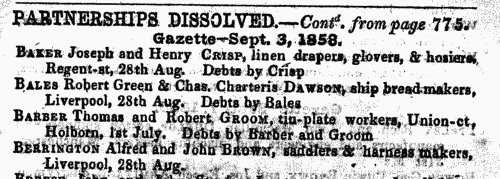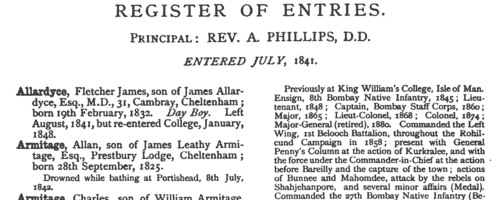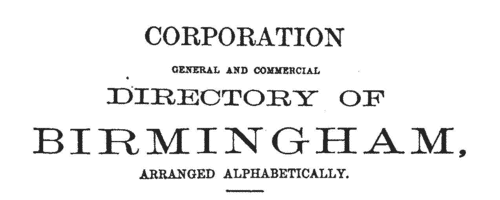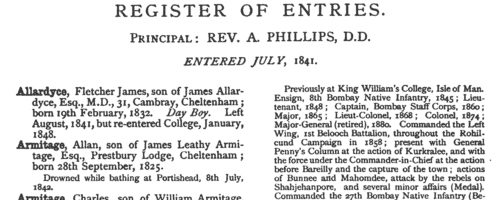Crewe Surname Ancestry ResultsOur indexes 1000-1999 include entries for the spelling 'crewe'. In the period you have requested, we have the following 293 records (displaying 211 to 220): Single Surname Subscription | | | Buying all 293 results of this search individually would cost £1,432.00. But you can have free access to all 293 records for a year, to view, to save and print, for £100. Save £1,332.00. More... |
These sample scans are from the original record. You will get scans of the full pages or articles where the surname you searched for has been found. Your web browser may prevent the sample windows from opening; in this case please change your browser settings to allow pop-up windows from this site. Dissolutions of partnerships in England and Wales
(1858)
Perry's Bankrupt and Insolvent Gazette, issued monthly, included lists of dissolutions of partnerships gazetted in England and Wales. The names of the partners are given in full, surnames in capitals, followed by trade and address, and date of the end of the partnership. Each entry usually ends with the phrase 'Debts by ...', indicating which partner intended to continue, and resume the responsibilities of, the business. This is the index to the names of the partners, from the issues from January to December 1858.CREWE. Cost: £6.00.  | Sample scan, click to enlarge

| Boys entering Cheltenham College
(1859)
Cheltenham College 'was founded in order to provide for the sons of gentlemen a Classical, Mathematical, and General Education of the highest order, on moderate terms, in strict conformity with the principles and doctrines of the Church of England.'
Andrew Alexander Hunter, the college registrar, compiled the first edition of the College Register in four parts from 1883 to 1886: these merely listed the boys by term of entry, with their dates of birth and names and addresses of their fathers. Circulars were also sent out to all Old Cheltonians whose addresses were known, requesting additional details. On the basis of the returns from these and Hunter's further researches, this much fuller register was published in 1890.
The information after each boy's name is given (where known and applicable) in this format: father's full name and address as of the time the boy entered the college; class and department on entering the college (classes being number from 1 downwards, and these again divided into A and B, some into C and D, others into P (Principal's side) and V. P. (Vice-Principal's side) - 1A was the highest class in each department: besides this, certain others were called Addiscombe, Woolwich, Civil, Direct, Line, Sandhurst, Naval, Special, Preparatory, Latin, and India Civil) and the same on leaving, name of Boarding House (or 'Day Boy'), scholastic and athletic honours attained at the college, and subsequent career (including date and place of death, or present address in 1890, if known).CREWE. Cost: £4.00.  | Sample scan, click to enlarge

| Boys entering Elizabeth College, Guernsey
(1860)
Elizabeth College, Guernsey, was founded in 1563 and rechartered in 1825. Charles James Durand, Kentish Brock and Edward Charles Ozanne compiled this edition of the college register, published in 1898. The names are arranged by term of entering the school, with a sequential number, surname and christian names in bold: then place and date of birth, father's name or reference to a brother previously at the school; and year of leaving. Beneath that, in smaller type, the compilers put what they could glean about the boy's subsequent career.CREWE. Cost: £4.00.  | Sample scan, click to enlarge

|  Dragoon guards fighting in China
(1860) Dragoon guards fighting in China
(1860)
The China Medal was awarded to soldiers and sailors who took part in the prosecution of the war against the Chinese from 1856 to 1860. Separate clasps were awarded for men who had been in receipt of the China Medal of 1842; for being actually present at Canton on 28 and 29 December 1857, when that city was bombarded and finally captured; for being actually engaged in the operations which ceased with the first capture of the Taku Forts, 20 May 1858, and led to the Treaty of Tientsin; for being actually present at the capture of the Taku Forts 21 August 1860; and for being actually present before Pekin the day the gate of that city was given up to the allied (British and French) army, viz. on 13 October 1860. The 1st (The King's) Regiment of Dragoon Guards (based in Canterbury) returned from the Crimea in July 1856, embarked for India 24 August 1857, and from there was transferred to China. The regiment took part in the capture of the Taku Forts and that of Pekin.CREWE. Cost: £8.00.  | Sample scan, click to enlarge

| British officers and civil servants in India dying or retiring
(1861)
The Indian Army and Civil Service List for July 1861 was printed by order of the Secretary of State for India in Council. Each issue recorded the names of those officers and officials lost by death or resignation in the year previous.CREWE. Cost: £6.00.  | Sample scan, click to enlarge

| Long-stay Paupers in Workhouses: Stapleton, Bristol
(1861)
This comprehensive return by the Poor Law Board for England and Wales in July 1861 revealed that of the 67,800 paupers aged 16 or over, exclusive of vagrants, then in the Board's workhouses, 14,216 (6,569 men, 7,647 women) had been inmates for a continuous period of five years and upwards. The return lists all these long-stay inmates from each of the 626 workhouses that had been existence for five years and more, giving full name; the amount of time that each had been in the workhouse (years and months); the reason assigned why the pauper in each case was unable to sustain himself or herself; and whether or not the pauper had been brought up in a district or workhouse school (very few had). The commonest reasons given for this long stay in the workhouse were: old age and infirm (3,331); infirm (2,565); idiot (1,565); weak mind (1,026); imbecile (997); and illness (493). CREWE. Cost: £6.00.  | Sample scan, click to enlarge

| Residents and Traders in Birmingham
(1861)
William Cornish's Corporation General and Trades Directory covered Birmingham, Coventry and the towns of the Black Country. The Birmingham section contains both street lists and this general alphabetical directory. CREWE. Cost: £4.00.  | Sample scan, click to enlarge

| Deaths, Marriages, News and Promotions
(1862)
Death notices and obituaries, marriage and birth notices, civil and military promotions, clerical preferments and domestic occurrences, as reported in the Gentleman's Magazine. Mostly from England and Wales, but items from Ireland, Scotland and abroad. July to December 1862CREWE. Cost: £4.00.  | Sample scan, click to enlarge

| Boys entering Cheltenham College
(1864)
Cheltenham College 'was founded in order to provide for the sons of gentlemen a Classical, Mathematical, and General Education of the highest order, on moderate terms, in strict conformity with the principles and doctrines of the Church of England.'
Andrew Alexander Hunter, the college registrar, compiled the first edition of the College Register in four parts from 1883 to 1886: these merely listed the boys by term of entry, with their dates of birth and names and addresses of their fathers. Circulars were also sent out to all Old Cheltonians whose addresses were known, requesting additional details. On the basis of the returns from these and Hunter's further researches, this much fuller register was published in 1890.
The information after each boy's name is given (where known and applicable) in this format: father's full name and address as of the time the boy entered the college; class and department on entering the college (classes being number from 1 downwards, and these again divided into A and B, some into C and D, others into P (Principal's side) and V. P. (Vice-Principal's side) - 1A was the highest class in each department: besides this, certain others were called Addiscombe, Woolwich, Civil, Direct, Line, Sandhurst, Naval, Special, Preparatory, Latin, and India Civil) and the same on leaving, name of Boarding House (or 'Day Boy'), scholastic and athletic honours attained at the college, and subsequent career (including date and place of death, or present address in 1890, if known).CREWE. Cost: £4.00.  | Sample scan, click to enlarge

| Boys entering Elizabeth College, Guernsey
(1868)
Elizabeth College, Guernsey, was founded in 1563 and rechartered in 1825. Charles James Durand, Kentish Brock and Edward Charles Ozanne compiled this edition of the college register, published in 1898. The names are arranged by term of entering the school, with a sequential number, surname and christian names in bold: then place and date of birth, father's name or reference to a brother previously at the school; and year of leaving. Beneath that, in smaller type, the compilers put what they could glean about the boy's subsequent career.CREWE. Cost: £4.00.  | Sample scan, click to enlarge

|
Research your ancestry, family history, genealogy and one-name study by direct access to original records and archives indexed by surname.
|













